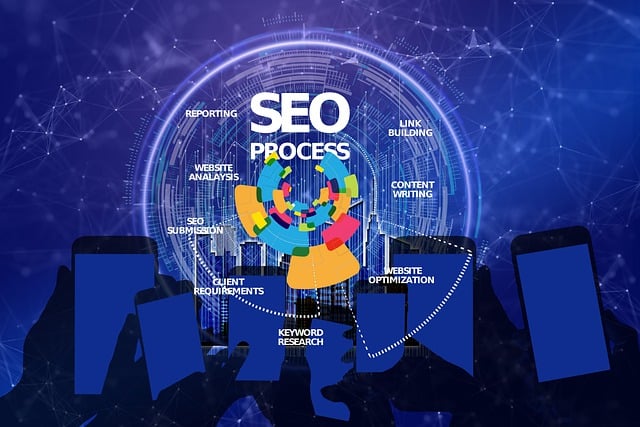Understanding SEO Services involves optimizing both on-page and off-page elements to enhance website rankings and visibility. On-page optimization includes creating high-quality, keyword-rich content and ensuring technical architecture for search engines. Off-page strategies focus on building backlinks, social media marketing, and positive reviews to signal trust and value. SEO Services are crucial for online success, driving organic traffic, boosting engagement, and offering long-term benefits without recurring costs. Key components include keyword research, on-page optimization (like meta titles and internal linking), link building, technical SEO (site structure & speed), local SEO, and measuring success through analytics. Adapting to trends like voice search and prioritizing user experience is essential for maintaining online competitiveness.
In today’s digital landscape, a robust online presence is non-negotiable for businesses aiming to thrive. Website SEO solutions are the cornerstone of achieving and maintaining exceptional web visibility. This article guides you through the intricate world of SEO services, breaking down essential components like on-page optimization, off-page strategies, technical fine-tuning, local targeting, and tracking success. By understanding these key elements, you’ll equip yourself to navigate the ever-evolving SEO trends and boost your online reach effectively.
Understanding Website SEO: The Basics Explained

Understanding Website SEO involves grasping the fundamental principles of how search engines like Google work and what factors influence a site’s ranking in search results. At its core, SEO Services focus on optimizing two primary aspects: on-page elements and off-page signals. On-page optimization includes content creation and structure that aligns with user intent and search terms. This means crafting relevant, high-quality content and ensuring your website’s technical architecture is sound, allowing search engines to easily crawl and index your pages.
Off-page SEO, on the other hand, pertains to activities outside your website that impact its ranking. This includes building high-quality backlinks from reputable sources, engaging in social media marketing to increase brand visibility, and earning positive reviews which signal to search engines that your site is trustworthy and valuable. Mastering these basics forms a solid foundation for implementing effective SEO Services to boost your online visibility and drive organic traffic.
Why Are SEO Services Essential for Online Visibility?

In today’s digital era, having a strong online presence is crucial for any business or individual seeking to thrive. However, with millions of websites competing for attention, standing out from the crowd can be challenging. This is where SEO Services come into play as an indispensable tool. Search Engine Optimization (SEO) ensures your website appears prominently in search engine results pages, thereby increasing its visibility to potential customers and audiences.
By optimizing various elements of a website, including content, structure, and performance, SEO Services enhance the user experience. This, in turn, boosts engagement, encourages visits, and fosters brand awareness. What’s more, effective SEO strategies can drive organic traffic, which is highly valued as it offers long-term benefits without the need for constant advertising costs. Thus, investing in SEO Services is a strategic move that paves the way for greater online success and competitiveness.
Key Components of Effective SEO Strategies

In today’s digital era, effective SEO Services are paramount for any website aiming to thrive online. Successful strategies are built on a foundation of key components that work in harmony to boost visibility and attract organic traffic. One crucial element is keyword research; identifying relevant search terms drives targeted content creation and ensures your site resonates with the right audience. On-page optimization, including strategic use of keywords, meta tags, and compelling content, plays a significant role in capturing search engine attention.
Link building is another vital component, as high-quality backlinks from authoritative sources enhance domain authority and trustworthiness. User experience also factors heavily; a website that offers seamless navigation, fast loading times, and mobile responsiveness not only improves engagement but also signals to search engines that it provides a valuable resource. Regular analysis and adaptation to algorithm updates ensure strategies remain effective over time.
On-Page Optimization: Enhancing Your Website's Content

On-Page optimization is a critical component of any comprehensive SEO Services. It involves enhancing your website’s content to improve its relevance and quality in the eyes of search engines. By optimizing individual web pages, you can ensure that each page has a clear focus, which helps both users and search algorithms understand what your site is about. This includes strategic use of keywords, crafting compelling meta titles and descriptions, and structuring content in a way that’s easily scan-able and digestible.
Effective on-page optimization also takes into account internal linking, where relevant pages within your site are linked to each other. This helps distribute page authority and encourages users to explore more of your content. Additionally, optimizing images with alt tags not only improves accessibility but also provides search engines with valuable context for visual content. These practices collectively contribute to a stronger online presence, driving better rankings in search results.
Off-Page SEO: Building Quality Backlinks and Authority

Off-page SEO is a powerful strategy that focuses on improving your website’s authority and visibility beyond your site itself. One of the key aspects is building high-quality backlinks, which are incoming links from other websites. These backlinks act as votes of confidence in the eyes of search engines, indicating that your content is valuable and trustworthy. When relevant and authoritative sites link to yours, it boosts your website’s credibility and helps search engines understand your site’s relevance within a specific niche.
This process involves various techniques such as guest blogging, where you contribute articles to popular blogs in your industry, securing backlinks to your SEO services-oriented website. Another effective method is influencer outreach, where you engage with influencers and ask for their support by featuring your content or products on their platforms, further enhancing your online presence and authority. These off-page SEO efforts contribute to a robust link profile, which search engines consider when ranking websites in search results.
Technical SEO: Ensuring Your Site is Search Engine Friendly

Technical SEO is an essential aspect of website optimization that focuses on improving a site’s visibility and performance in search engine results through behind-the-scenes adjustments. It involves optimizing various technical elements to ensure your site is easily crawlable, indexable, and accessible to search engines like Google. By implementing best practices in Technical SEO, you enhance the overall user experience and signal to search engines that your website is a valuable resource.
This includes optimizing site structure, improving page load speeds, ensuring mobile-friendliness, creating XML sitemaps, and implementing structured data markup. These strategies not only help search engines understand your content better but also contribute to higher rankings, increased organic traffic, and improved conversion rates. Effective Technical SEO is crucial for any business looking to excel in the competitive digital landscape and attract the right audience through top-quality SEO services.
Local SEO: Targeting Your Nearby Audience Effectively

Local SEO is a powerful strategy for businesses aiming to dominate their nearby market. By optimizing your website and online presence for local search, you can attract and engage customers within your immediate geographic reach. This involves ensuring your business information is consistent and accurate across various online platforms, including Google My Business, Yelp, Facebook, and industry-specific directories. Crafting location-based keywords into your content and leveraging customer reviews will further enhance your local SEO efforts.
Effective Local SEO means understanding your target audience’s needs and preferences. It involves researching and incorporating relevant local terms and phrases that potential customers might use when searching for businesses like yours in their area. This localized approach not only helps search engines understand your relevance but also allows you to connect with your audience on a more personal level, increasing the chances of conversion and fostering long-term customer relationships.
Measuring Success: Tracking SEO Performance Metrics

Measuring success is a vital aspect of any digital marketing strategy, and SEO services are no exception. By tracking key performance metrics, businesses can gain valuable insights into the effectiveness of their optimization efforts. These metrics include organic traffic growth, keyword rankings, click-through rates (CTRs), and conversion rates. Regularly monitoring these indicators allows for data-driven decisions, enabling companies to refine their SEO strategies and stay ahead in a competitive online landscape.
Using advanced analytics tools, businesses can identify which aspects of their website are performing well and which areas require improvement. For instance, a surge in organic traffic might indicate successful keyword optimization, while low CTRs could signal the need for better content or metadata. This data-backed approach ensures that SEO services are optimized to deliver tangible results, aligning with business goals and contributing to long-term online success.
Staying Ahead: Future Trends in SEO Services

The digital landscape is constantly evolving, and so too are the strategies that drive online visibility – specifically, SEO services. To stay ahead in today’s competitive market, businesses must be adept at adapting their SEO solutions to emerging trends. One prominent trend gaining traction is the increased focus on user experience (UX). Search engines prioritize websites that offer seamless navigation, fast loading times, and mobile-friendliness. As a result, investing in UX design has become a game-changer for many businesses aiming to improve their search rankings.
Another future trend worth noting is the rise of voice search optimization. With virtual assistants like Siri and Alexa becoming household names, more users are leveraging voice commands to access information. This shift presents an opportunity for businesses to optimize their content for long-tail keywords and natural language queries, ensuring their websites are among the first results when users speak rather than type.
